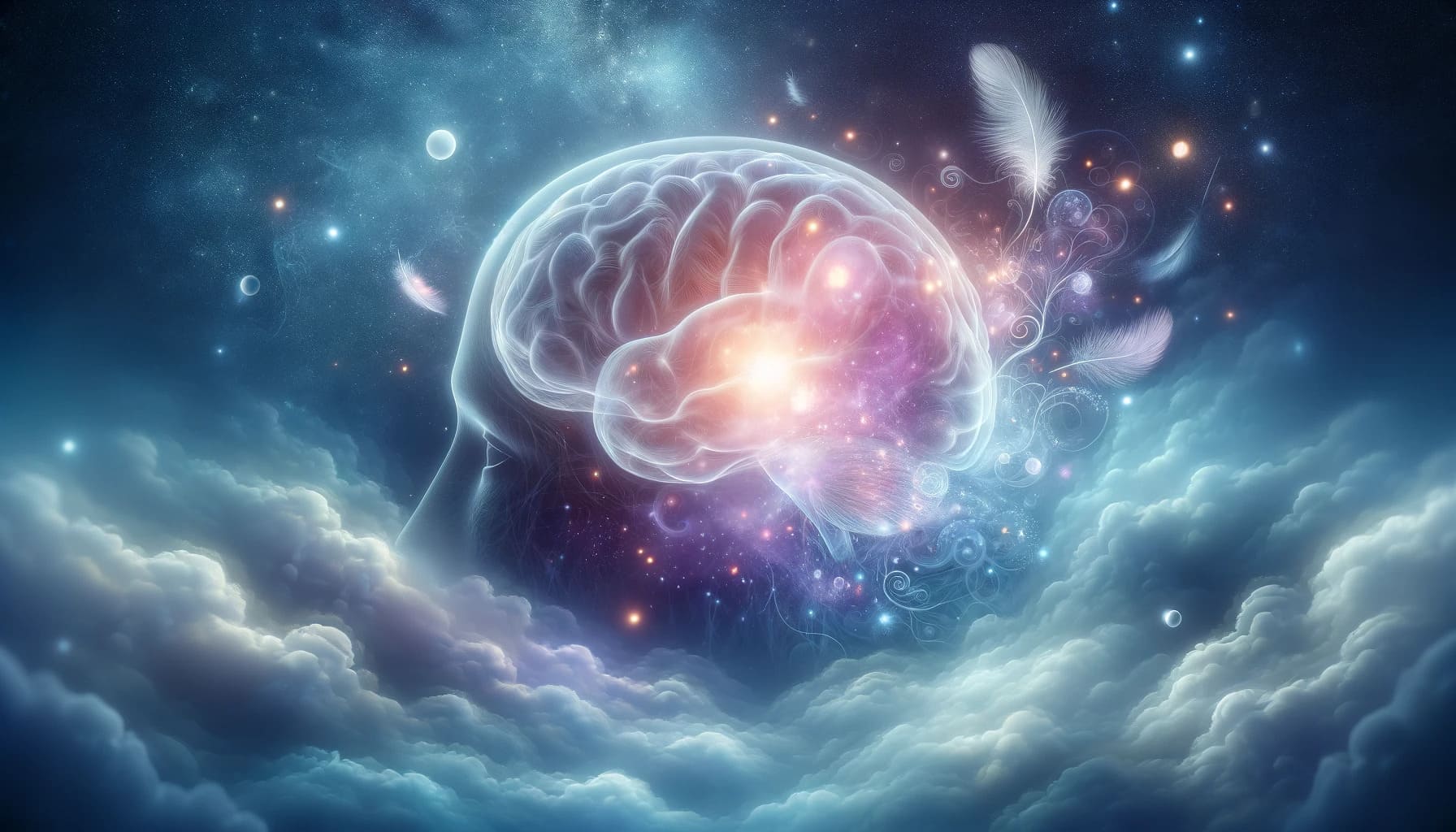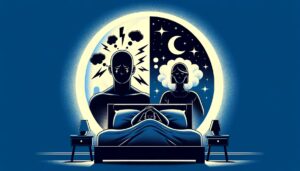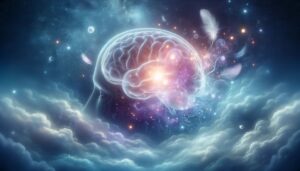Understanding Sleep and Dream State
When we drift off to sleep, our bodies embark on an intricate journey through different stages, each pivotal for our health and well-being. This section will guide you through the fascinating realms of both dream state and deep sleep, offering insights into their roles and characteristics.
What are the Sleep Stages?
Sleep isn't just a uniform block of time when we're not awake. It's a complex cycle of stages, each distinct in its physiological attributes and importance for health. The sleep cycle consists primarily of REM (Rapid Eye Movement) sleep and NREM (Non-Rapid Eye Movement) sleep, which is further divided into three stages, with the third being deep sleep.
- NREM Stage 1: This is a light sleep where we can be easily awakened. It's a short transition phase that lasts several minutes.
- NREM Stage 2: Sleep deepens slightly with reductions in heart rate and body temperature. This stage accounts for the majority of our sleep time.
- Deep Sleep (NREM Stage 3): This is the most restorative phase, crucial for physical recovery and aspectss such as immune function.
- REM Sleep: Occuring approximately 90 minutes after falling asleep. This stage is associated with vivid dreaming supported by increased brain activity.
Navigating these stages efficiently is imperative for achieving restorative sleep, emphasizing the need to understand each phase's intricacies.
Characteristics of REM Sleep
REM sleep, characterized by quick, random movements of the eyes, plays a crucial role in mental health by facilitating processes like memory consolidation and emotional regulation. This stage of sleep is marked by increased brain activity, almost mirroring the waking state, making it a prime time for vivid dreams. REM's signature attributes include:
- Increased brain wave activity: Similar to when you're awake.
- Muscle atonia: A near-paralysis of the body's muscles, preventing movement during vivid dreams.
- Dreaming: Most dreams occur during this stage, often remembered if awakened during REM.
Understanding REM's characteristics can underscore its significance in cognitive functions and emotional health, offering more than just a scene for dreams.
Characteristics of Deep Sleep (NREM Stage 3)
Deep sleep, or NREM Stage 3, is the titan of the body’s restoration process. This stage is when the body repairs itself, and energy is replenished. The brain significantly slows down, paving the way for a few vital processes:
- Cell regeneration: Enhanced repair and regeneration of cells.
- Energy restoration: Your body gathers energy for the next day.
- Hormonal regulation: Hormones that contribute to growth and development are released.
This stage of sleep is less about the stories we see in dreams and more about giving the body the restoration it craves.
The Science Behind Dreaming and Deep Sleep

Diving into the neurophysiology of sleep, it's fascinating to see how brain wave patterns adapt during REM and deep sleep. During REM, the brain shows waves akin to waking states, lending to the dynamic narratives experienced in dreams. Conversely, deep sleep shows delta waves, slow and large waves, pivotal for cognitive recovery and memory storage.
Both stages are essential; where REM orchestrates the cognitive and emotional processing through dreams, deep sleep focuses on physical health and recovery, making both indispensable.
Sleep Cycles and Transitions Between Stages
As we sleep, we cycle through these stages approximately every 90 minutes. The transition from deep sleep back to REM sleep is where a lot of sleep's magic happens—each cycle boosting more REM sleep, making dreams progressively longer and vivid through the night. Understanding these transitions can reveal a lot about sleep disorders and ways to enhance sleep quality.
REM vs. Deep Sleep: Key Differences
While REM and deep sleep stages both contribute significantly to health, their roles and activities differ starkly:
- Brain activity: REM mimics an awake brain, while deep sleep features minimal activity.
- Physical recovery: Handled during deep sleep, but absent in REM.
- Memory functions: REM helps with emotional memories and learning, whereas deep sleep helps with factual memory and physical competency.
Exploring these differences helps us appreciate how balanced sleep cycles cater to both our physical and mental needs, enhancing overall health and well-being.
The Role of REM and Deep Sleep in Health
Deep sleep and REM sleep stages play pivotal roles in maintaining our overall health and wellness. These stages are not just about shutting down for a while, but they are actively involved in various health-promoting processes that keep us functioning at our best.
Restorative Functions
Deep Sleep is incredibly beneficial for physical health, aiding in tissue growth and repair, and strengthening the immune system. On the other hand, REM sleep supports brain functions, including cognitive health and emotional resilience. This stage helps in processing emotions, integrating memories, and mitigating stress.
Disease Prevention
Regular cycles of deep and REM sleep have been linked to a lower risk of developing chronic diseases such as heart disease, diabetes, and obesity. Quality sleep stages help regulate metabolism and stress hormones, which are critical factors in these conditions.

Importance for Cognitive Functions and Memory
The synergy between deep sleep and REM sleep is crucial for cognitive functionality and memory consolidation. Each stage has a unique contribution to how we learn, remember, and think.
Cognitive Performance
During deep sleep, the brain processes and consolidates new knowledge and memories, essential for learning and cognitive health. REM sleep, meanwhile, plays a crucial role in integrating these memories within a wider psychological context, aiding in problem-solving and creative thinking.
Memory Consolidation
REM sleep is particularly vital for emotional memories, converting daily experiences into long-term memories during this stage. This is due to the high level of brain activity. Conversely, deep sleep is critical for consolidating fact-based memories.
Sleep Disorders Affecting REM and Deep Sleep
Many sleep disorders can interrupt these crucial stages, disrupting their health benefits. Understanding these disorders can be a step towards remedial action.
Common Disorders:
- Sleep Apnea: Causes frequent awakenings during the night, severely disrupting the sleep cycle and reducing time spent in both REM and deep sleep.
- Insomnia: Can prevent the onset of sleep and limit the duration of deep sleep phases.
- Narcolepsy: May cause individuals to enter REM sleep abruptly, skipping initial stages of deep sleep necessary for physical restoration.
Sleep disorders not only disrupt the quality of sleep but also its restorative processes, emphasizing the importance of treating these conditions for maintaining health.
Tips for Enhancing Sleep Quality
Improving sleep quality is not just about increasing the quantity of sleep. It’s about enhancing the quality and consistency of sleep cycles. Here are a few evidence-based strategies:
Lifestyle Adjustments
- Consistent Sleep Schedule: Go to bed and wake up at the same time every day.
- Relaxing Bedtime Routine: Engage in calm activities like reading or meditating before bed to signal to your brain that it's time to wind down.
- Optimal Sleep Environment: Ensure your bedroom is dark, quiet, and cool.

Diet and Exercise
- Avoid Stimulants: Limit caffeine and nicotine close to bedtime.
- Physical Activity: Regular exercise can promote quicker sleep onset and more restorative sleep. However, avoid vigorous activity close to bedtime.
Enhancing your sleep quality can dramatically improve how well you function during the day, bolstering everything from your mood to your immunity.
Balancing REM and Deep Sleep
Achieving a balanced sleep cycle, where both REM and deep sleep are optimized, is essential for comprehensive health. Here’s how you can foster a more balanced sleep cycle:
Strategies for Balanced Sleep:
- Limit Daytime Naps: Excessive napping can disrupt nighttime sleep cycles.
- Manage Stress: High stress can interfere with the ability to enter deeper stages of sleep.
- Temperature Control: Sleeping in a cooler room can help facilitate the onset of deep sleep.
Balancing these stages allows for a holistic restoration of both mind and body, supporting overall well-being and functionality.
Latest Research on Sleep Stages
Ongoing research continues to shed light on the intricate dynamics of sleep stages. Recent studies have highlighted:
- The potential for deep sleep to help clear brain toxins, possibly lowering the risk of neurodegenerative diseases.
- How REM sleep plays a central role in emotional and psychological health.
Staying informed about the latest research can help individuals make informed choices about their sleep habits and health.
FAQs About Dreaming and Deep Sleep
Here are answers to some common questions concerning dreaming and deep sleep:
Frequently Asked Questions
- Can dreams occur during deep sleep?
- Rarely, most dreams occur during REM sleep, but it is possible to experience dream-like fragments in deep sleep.
- How can I increase my deep sleep duration?
- Focus on consistent sleep schedules, managing stress, and avoiding alcohol and heavy meals before bedtime.
Understanding these facets of REM and deep sleep can significantly influence how we approach our sleep health, impacting our overall lifestyle and wellness.
In wrapping up, this exploration into REM and deep sleep reveals their immense influence on our health, both mental and physical. By fostering better sleep habits and understanding the underlying science, we can enhance our quality of life and tap into the profound benefits that good sleep has to offer.







0 Comments